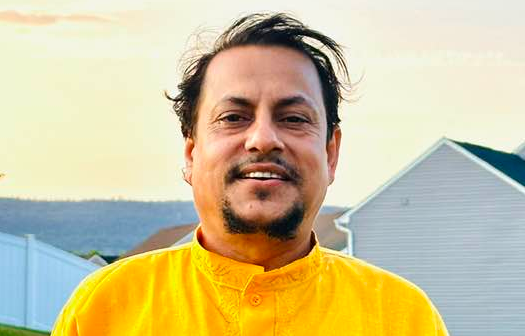By Nanda Bhandari (Nimesh)
Sydney Australia
Basic Introduction:
In the annals of agricultural science and human rights advocacy, few names shine as brightly as Dr. Govinda Rizal. A distinguished plant breeder and molecular biologist who accomplished his PhD at Kyoto University in Japan, Dr. Rizal made significant contributions to the field of paddy cultivation in the international arena including the Philippines. Beyond his scientific achievements, he was a relentless advocate for Bhutanese human rights and democracy, serving as a guiding light and beacon of hope for Bhutanese refugees still seeking their fate and destiny in Eastern Nepal. As an Assistant Professor at the Tribhuvan University Agricultural Department, Dr Rizal’s influence extended from academic circles to the hearts of countless individuals who admired his dedication and resilience until he was mercilessly crushed to death in a suspicious bus accident in Kathmandu on May 5, 2024.
A Pioneer in Agricultural Science among the Bhutanese in diaspora.
Dr. Rizal’s journey in agricultural science began with a passion for improving food security and sustainability. While at Kyoto University or post PhD, he mentioned in his book “Pardesi in Paradise”, that he travelled to different countries as a part of his learning journey and engaged in pioneering research on paddy cultivation, aiming to enhance crop yields and resilience. His work was characterised by a meticulous approach to research and a profound understanding of the challenges farmers face, especially in developing countries. Dr. Rizal’s contributions to agricultural science have left an indelible mark, providing innovative solutions that continue to benefit farmers and researchers globally.
Championing Human Rights and Democracy
While Dr. Rizal’s professional achievements are noteworthy, his legacy in human rights advocacy is equally significant. As a Bhutanese refugee, Dr. Rizal was acutely aware of the plight of his fellow refugees languishing in camps in Eastern Nepal. He emerged as a prominent voice for Bhutanese human rights, tirelessly advocating for democratic reforms and the dignified repatriation or resettlement of refugees. His efforts were instrumental in bringing international attention to the struggles of Bhutanese refugees, highlighting the need for justice and humanitarian support.
A Guiding Light for Bhutanese Refugees
Dr. Rizal’s commitment to his community was unwavering. He worked tirelessly to uplift the spirits and conditions of Bhutanese refugees, offering hope and inspiration. Through his advocacy, he provided a voice to the voiceless, ensuring that the world did not forget the injustices faced by the Bhutanese in exile. His efforts helped mobilize support from various international organizations and governments, contributing to significant strides in refugee movements and human rights protections.
Academic Contributions and Literary Works
At Tribhuvan University, Dr. Rizal imparted his knowledge and expertise to a new generation of agricultural scientists. As an Assistant Professor, he was revered for his dedication to teaching and mentorship. His academic contributions were further enriched by his literary works, including two notable books: “Bejod Banda” and “A Pardesi in Paradise.” These works encapsulate his profound experiences and reflections, offering readers a glimpse into his life and the broader struggles of the Bhutanese diaspora.
Remembering a Remarkable Legacy
Dr. Govinda Rizal’s legacy is one of resilience, compassion, and relentless pursuit of justice. His life’s work transcended the boundaries of science and advocacy, leaving a lasting impact on both fields. As we commemorate his contributions, we are reminded of the power of one individual to effect change and inspire hope. Dr. Rizal’s legacy will continue to inspire future generations of scientists, human rights advocates, and individuals committed to making a difference in the world.
In honouring Dr. Rizal, we celebrate not only his achievements but also the spirit of perseverance and dedication that he embodied. His life is a testament to the enduring power of hope and the relentless pursuit of a better future for all.
Dr Rizal in my memory
To me, Dr. Govinda Rizal was a humble, creative, and charismatic individual who never developed foes. A down-to-earth man with a creative mindset, he made significant impacts on the lives of Bhutanese in refugee camps during the pre-resettlement phase. His hut was on my way to school in Beldangi II Extension, and from a young age, I always saw him actively engaged in various pursuits. As a teacher at Marigold Academy, he taught science and mathematics to students in years 6, 7, and 8, while I was in year 4 or 5. In his free time, he dedicated himself to thinking creatively for the benefit of his fellow refugees. His efforts included activism through the Appeal Movement Coordinating Council (AMCC) in 1996, establishing camp-based disability support services (later taken over by CARITAS Nepal), and co-founding the Community Development Centre (CDC). Through these initiatives, many Bhutanese refugees with disabilities or minimal education gained independence and basic literacy skills. As a young teenager, I witnessed him tirelessly promoting social services for the welfare of fellow refugees. He played marbles, or ‘goti,’ with people with disabilities, significantly boosting their independence and self-esteem. He became a godfather figure to many disabled refugees. Lately, he has been involved in various initiatives related to the Bhutanese diaspora. This includes serving as the chief editor of the Bhutan Watch Research team, providing hope for those still languishing in refugee camps, and acting as a focal point for resettled Bhutanese in eight different Western countries.
A Legacy That Endures
Dr. Govinda Rizal’s legacy as a pioneering agricultural scientist and a passionate human rights advocate will live on among us. His innovative contributions to paddy cultivation internationally and his relentless efforts to uplift Bhutanese refugees reflect a life dedicated to the betterment of others. Through his teaching at Tribhuvan University and his literary works, he inspired countless individuals. Dr. Rizal’s compassionate spirit, creativity, and dedication to social service have left an indelible mark, ensuring that his memory will continue to inspire future generations in the fields of science, education, and human rights advocacy.
His passing has left an immense and heartbreaking void in all the community initiatives he spearheaded and supported. The Bhutanese diaspora, myself included, cannot come to terms with this appalling and tragic loss that extinguished our hope. May his soul rest in eternal peace.


